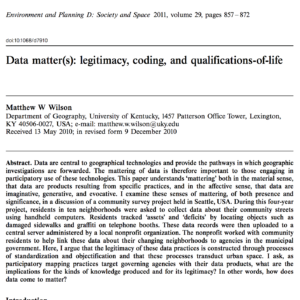Living Fruitfully in/with the conditions of (im-) possibilty
In this talk, I want to revisit a piece I wrote in 2016. The piece, a chapter in Dawn Nafus’ book Quantified (2016), was intended as a story of promise, a fabulation about London’s bike rental scheme and how it might be used to re-imagine new figurings of human-machine relations. Thinking across, askew, or “athwart” (Hustak & Myers 2013), my experimenting with the relational capacities of bicycles, a city, (bio)sensing and the proliferation of data-everywhere, aimed to resist the “agencies of homogenization” (Scott 1998) to explore the conditions of possibility for other worldings (Haraway 2016).
Reflecting on this work, I’ve felt a dissatisfaction with my efforts to throw together mixtures of data at all scales, with the attempts at thickening and enlivening the relations. It all felt too flat, too lacking in vitality. So, at the risk of appearing self indulgent, this talk will present some early ideas for a different story woven in and through the thicket of relations. Struggling to weave myself into London’s legacy with slavery and the violent erasures of bodies and agency (Hartman 2008), I’ll be trying to place myself at a much more fragile and tenuous juncture of space-time, but at the same time still seeking to work fruitfully in/with the conditions of (im-)possibility.
